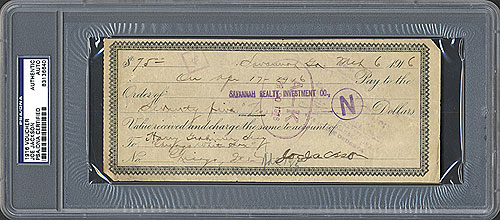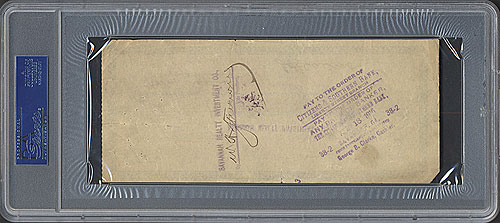Search
1916 Joe Jackson Signed Voucher (Jackson Family Provenance!)
Sold For:
$64,625
Year: 1916
Auction: 2011 Spring
Lot #: 2
Auction: Autographed Baseballs/Flats/Photos
This extraordinary document, dating from 1916, features the signature of "Shoeless Joe" Jackson, perhaps the rarest and most highly prized signature in all of sports. Jackson's signature, which is beautifully executed in black fountain pen at the base of the front, is virtually flawless ("8/9"). This document, which at first glance appears to be a check, is actually a voucher that records a mortgage payment made by the Chicago White Sox for Jackson! The voucher, which is both preprinted and filled in by hand, is dated "Savannah Ga. Mch 6, 1916" and reads "On Apr 17 - 1916 Pay to the Order of Savannah Realty Investment Co., Sixty-Five 00/100 Dollars - Value received and charge the same to account of Harry Grabiner Secy Chicago White Sox, Chicago, Illinois." It is signed by Jackson in approval of the White Sox making this payment for him, which would then be deducted from his salary with the club. An endorsement stamp of the Savannah Realty Investment Co., appears on the reverse, below which is the signature of the company's vice president. Bank stamps appear on both the front and reverse.
The nature and timing of this business transaction between Jackson, the White Sox, and the Savannah Realty Investment Co., is well documented. According to Donald Gropman's authoritative biography of Jackson, Say It Ain't So, Joe!: The True Story of Shoeless Joe Jackson (Kensington Publishing Corp., New York, 2002), Jackson had just purchased a home in Savannah in 1916: "Ever since his season with the Savannah Indians in 1909, Joe had thought of moving to Savannah. Then his little sister Lulu got married and moved there. Finally, in 1916, Joe and Katie [his wife] bought a house on the Savannah waterfront for ten thousand dollars. His mother and little sister Gertrude came to live with them, but Joe and Katie were only there during the off season." Ten thousand dollars was a lot of money at that time and Jackson obviously needed to leverage a portion of his monthly salary with the White Sox against the cost of the mortgage. 1916 also marked Jackson's first full season with the White Sox, and it was exactly at the time this voucher was signed that Jackson was receiving national attention from the baseball world, but not in a positive light. Jackson was traded from Cleveland to Chicago on August 21, 1915, at which time he was batting .327. However, in forty-five games with the White Sox he only managed to post a .272 average. That precipitous drop caused many to question his ability and he entered the 1916 season under a microscope. As chronicled by Gropman: "His average for the entire 1915 season was .308, the lowest he had ever had. His critics were quick to say that he was all washed up. Baseball Magazine sent a man to Greenville to collect material for the 'Joe Jackson Number,' the issue of the magazine published in March 1916. They called the feature article about Joe 'The Man Who Might Have Been the Greatest Player in the Game.'" Jackson, of course, proved his nay sayers wrong in 1916, finishing the year with a .341 average and a league-leading twenty-one triples. While Jackson's role in the 1919 World Series scandal will forever be debated by historians and scholars, there will never be any debate regarding his ability as a hitter. Jackson finished his thirteen-year career with a .356 lifetime average, second only to Ty Cobb.
This piece represents one of the finest Joe Jackson signed items in existence, both with regard to the condition of the signature and, most important, its impeccable provenance. Part of the legend of Joe Jackson, of course, was that he was illiterate and could not sign his name. In fact, he could sign his name, which he learned to do by copying his wife"™s "Joe Jackson" signature, but only with great effort, and he did so only when absolutely necessary. The signing of this legal document was one of those rare instances, as it required his signature as verification for the transaction. We estimate that fewer than ten Joe Jackson signatures are known to exist on legal documents, making this an exceedingly rare and verifiably authentic example of baseball's most sought-after signature. While the signature itself is exemplary in all respects, its provenance is equally impressive. This piece is one of approximately five such vouchers that were purchased around 1990 directly from Joe Jackson's sister, Gertrude. To date, we have only seen two of the other examples obtained at that time offered at public auction, both of which were sold in the early 1990s. (The first of the vouchers sold at public auction for $27,500 in 1993; the second was sold shortly after at Sotheby's for a similar amount.) The remaining vouchers obtained from Gertrude were all sold privately, including the offered piece. This voucher has been in our consignor's collection since the early 1990s and, from what we have learned (we spoke to the gentleman who was involved in the original purchase from Gertrude) it is the finest in terms of condition. One of the inherent flaws plaguing the few known examples of these payment vouchers is the presence of bank cancellation holes (on one example the holes ran completely through the Jackson signature). This example features no such cancellation holes, nor is the signature affected by any cancellation stamps. The voucher (8.25 x 3.5 inches) displays a small horizontal tear in the left border, a tiny chip in both the upper right and lower left corners, and a number of staple holes on the left side of the voucher. In Very Good to Excellent condition overall. The last Joe Jackson signature on a document to be sold in modern times was actually just a cut portion of a document. Presented at auction by REA in 2007 (Lot 640), that Jackson signature example, which was once part of the legendary Barry Halper Collection, sold for $44,062. Joe Jackson signatures, especially of this quality and with such impeccable provenance, are seldom seen at public auction, making this an exceptional and rare opportunity to acquire what might be the finest example in existence. LOA from James Spence/JSA. Reserve $25,000. Estimate $50,000+. SOLD FOR $64,625
The nature and timing of this business transaction between Jackson, the White Sox, and the Savannah Realty Investment Co., is well documented. According to Donald Gropman's authoritative biography of Jackson, Say It Ain't So, Joe!: The True Story of Shoeless Joe Jackson (Kensington Publishing Corp., New York, 2002), Jackson had just purchased a home in Savannah in 1916: "Ever since his season with the Savannah Indians in 1909, Joe had thought of moving to Savannah. Then his little sister Lulu got married and moved there. Finally, in 1916, Joe and Katie [his wife] bought a house on the Savannah waterfront for ten thousand dollars. His mother and little sister Gertrude came to live with them, but Joe and Katie were only there during the off season." Ten thousand dollars was a lot of money at that time and Jackson obviously needed to leverage a portion of his monthly salary with the White Sox against the cost of the mortgage. 1916 also marked Jackson's first full season with the White Sox, and it was exactly at the time this voucher was signed that Jackson was receiving national attention from the baseball world, but not in a positive light. Jackson was traded from Cleveland to Chicago on August 21, 1915, at which time he was batting .327. However, in forty-five games with the White Sox he only managed to post a .272 average. That precipitous drop caused many to question his ability and he entered the 1916 season under a microscope. As chronicled by Gropman: "His average for the entire 1915 season was .308, the lowest he had ever had. His critics were quick to say that he was all washed up. Baseball Magazine sent a man to Greenville to collect material for the 'Joe Jackson Number,' the issue of the magazine published in March 1916. They called the feature article about Joe 'The Man Who Might Have Been the Greatest Player in the Game.'" Jackson, of course, proved his nay sayers wrong in 1916, finishing the year with a .341 average and a league-leading twenty-one triples. While Jackson's role in the 1919 World Series scandal will forever be debated by historians and scholars, there will never be any debate regarding his ability as a hitter. Jackson finished his thirteen-year career with a .356 lifetime average, second only to Ty Cobb.
This piece represents one of the finest Joe Jackson signed items in existence, both with regard to the condition of the signature and, most important, its impeccable provenance. Part of the legend of Joe Jackson, of course, was that he was illiterate and could not sign his name. In fact, he could sign his name, which he learned to do by copying his wife"™s "Joe Jackson" signature, but only with great effort, and he did so only when absolutely necessary. The signing of this legal document was one of those rare instances, as it required his signature as verification for the transaction. We estimate that fewer than ten Joe Jackson signatures are known to exist on legal documents, making this an exceedingly rare and verifiably authentic example of baseball's most sought-after signature. While the signature itself is exemplary in all respects, its provenance is equally impressive. This piece is one of approximately five such vouchers that were purchased around 1990 directly from Joe Jackson's sister, Gertrude. To date, we have only seen two of the other examples obtained at that time offered at public auction, both of which were sold in the early 1990s. (The first of the vouchers sold at public auction for $27,500 in 1993; the second was sold shortly after at Sotheby's for a similar amount.) The remaining vouchers obtained from Gertrude were all sold privately, including the offered piece. This voucher has been in our consignor's collection since the early 1990s and, from what we have learned (we spoke to the gentleman who was involved in the original purchase from Gertrude) it is the finest in terms of condition. One of the inherent flaws plaguing the few known examples of these payment vouchers is the presence of bank cancellation holes (on one example the holes ran completely through the Jackson signature). This example features no such cancellation holes, nor is the signature affected by any cancellation stamps. The voucher (8.25 x 3.5 inches) displays a small horizontal tear in the left border, a tiny chip in both the upper right and lower left corners, and a number of staple holes on the left side of the voucher. In Very Good to Excellent condition overall. The last Joe Jackson signature on a document to be sold in modern times was actually just a cut portion of a document. Presented at auction by REA in 2007 (Lot 640), that Jackson signature example, which was once part of the legendary Barry Halper Collection, sold for $44,062. Joe Jackson signatures, especially of this quality and with such impeccable provenance, are seldom seen at public auction, making this an exceptional and rare opportunity to acquire what might be the finest example in existence. LOA from James Spence/JSA. Reserve $25,000. Estimate $50,000+. SOLD FOR $64,625


